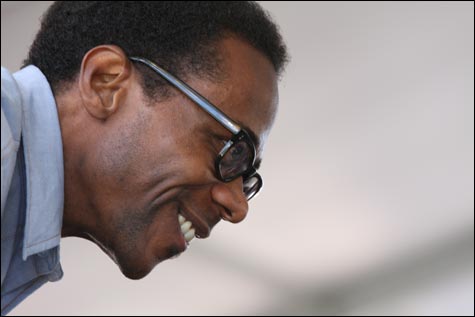Brian Blade and company help blaze jazz’s newest path
By JON GARELICK | October 20, 2008

FREESTYLING: Blade’s Fellowship Band has no trouble mixing Joni Mitchell with their Coltrane. |
Jazz Brunch Top 5
1. Jimmy Herring, Lifeboat [Abstract Logix]
2. New York Electric Piano, King Mystery [Buffalo Puppy]
3. Danilo Pérez/Claus Ogerman, Across the Crystal Sea [Emarcy]
4. E.S.T., Leucocyte [Emarcy]
5. Richard Bona, Bona Makes You Sweat [Blue Note] |
The jazz tide is shifting once again. Over the past 40 years, wave after wave of the avant-garde, jazz-rock fusion, and funk has broken and been absorbed. But in the last decade or so, yet another concept of jazz has begun to take in the pop music of our time.It’s easier to define this music by what it isn’t than by what it is. It has no special allegiance to 4/4 swing — the walking-bass and dotted-rhythm ride-cymbal patterns that, along with ballads and brushes, irritate so many rock fans. Neither is there the core of Great American Songbook 32-bar standards that serve as the food for typical jazz ideas about form and harmony. There’s little of the cross-currents of Africa and Stockhausen and Cage that have influenced the avant-garde. There’s not even a lot of blues.
Instead, there’s Joni Mitchell and Radiohead and Björk. (Travis Sullivan’s Björkestra even specialize in the Icelandic chanteuse as big-band jazz.) The Bad Plus appropriate everything from Queen and Black Sabbath to Neil Young and Nirvana. Even when jazz musicians aren’t actually covering these artists, they’re listening hard. Brad Mehldau’s 2002 Largo (Warner Bros.) and Kurt Rosenwinkel’s 2003 Heartcore (Verve) were benchmarks, both in musical content and in the use of pop studio production techniques. On his recent Invisible Cinema (Blue Note), pianist Aaron Parks (a Rosenwinkel bandmember) offered a couple of originals that could have come right out of the Radiohead playbook. In this context, “real” jazz can sound strange. At a Bad Plus show a couple of years ago, I remember hearing — a good 40 minutes into the set —something strangely familiar from pianist Ethan Iverson. The friend who was sitting with me — a jazz pianist — leaned over and whispered, “That’s the first jazz chord they’ve played tonight.”
One of the outfits quietly blazing a path is Brian Blade’s Fellowship Band, who’ll be at Scullers for two shows on November 6. Now 38, Blade has been a comer for years, since his work in the ’90s with Kenny Garrett and Joshua Redman. His sensitivity and fluid sense of time were soon in great demand, going against the grain of the tight, funk-inflected playing of the time. “No one plays like this anymore,” a drummer friend of mine marveled as we watched Blade perform with Redman at a Boston convention of the International Association of Jazz Educators. “He sounds like Elvin.” For the past eight years, Blade has been a member of Wayne Shorter’s acoustic quartet. It doesn’t get more jazz than that.
But he’s also recorded with Bob Dylan, and he’s a regular partner with Dylan producer and guitarist Daniel Lanois. And over the past 10 years, he’s released three albums with his Fellowship Band, whose core is Blade and keyboardist Jon Cowherd, who do all the writing, but also bassist Chris Thomas and reedmen Myron Walden and Melvin Butler, all of whom have been there since the beginning. Rosenwinkel, meanwhile, has been on board for the past two albums.
 Related
Related:
More than guitar, Best in their field, One night, one jazz trifecta, More 
- More than guitar
"I like using songs to change the environment — to get the listener's ear to be a little skewed."
- Best in their field
The jazz scene continues to struggle — along with everyone else — through hard times.
- One night, one jazz trifecta
True, there aren't enough paying gigs for musicians, but the live music is out there — and last Wednesday, I had to scramble to make three promising shows.
- The doctor is in
That Stanley Sagov plays jazz at all is impressive. That he plays it at such a high level is stunning.
- Wild things
Jane Ring Frank's Boston Secession, which calls itself a "professional choral ensemble," began its 12th season with a short but ambitious program.
- Tweak-folk
Released this summer, Nico Muhly's Mothertongue (Bedroom Community) — the latest album by the ambitious contemporary classical music composer, a protégé of Philip Glass — offers listeners a bombastic example of the ongoing collaboration between the composer and Vermont-based folk singer Sam Amidon.
- True voices
When I first checked out Travis Sullivan's Björkestra live, it wasn't to see the singer. But live, the Björkestra (at the Regattabar last October) turned my expectations upside down.
- The electric company
We all know how in 1965, at the Newport Folk Festival, the previously all-acoustic Bob Dylan took the stage with an electric guitar, plugged in, enraged fans, and destroyed the folk-music scene forever.
- Covering Lacy
For Josh Sinton, Steve Lacy stood out almost from the beginning.
- Making it sing
If you come to Dee Dee Bridgewater’s new Billie Holiday tribute disc — or to her two Holiday shows at the Paramount Theatre this weekend — expecting a reverent impersonation, you could be in for a shock. Bridgewater has transformed the music and persona of the jazz icon.
- The onliest Sonny
Sonny Rollins has held the unofficial title of world’s greatest living improviser at least since the early ’70s, following the death of John Coltrane and the second of two extended Rollins sabbaticals from public performance.
- Less

 Topics
Topics:
Jazz
, Entertainment, Joshua Redman, Folk Music, More  , Entertainment, Joshua Redman, Folk Music, John Coltrane, McCoy Tyner, Brad Mehldau, The Bad Plus, The Bad Plus, University of New Orleans, Brian Blade, Less
, Entertainment, Joshua Redman, Folk Music, John Coltrane, McCoy Tyner, Brad Mehldau, The Bad Plus, The Bad Plus, University of New Orleans, Brian Blade, Less 